|
|
|
Sort Order |
|
|
|
Items / Page
|
|
|
|
|
|
|
| Srl | Item |
| 1 |
ID:
121113
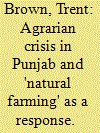

|
|
|
|
|
| Publication |
2013.
|
| Summary/Abstract |
After four and a half decades of Green Revolution agrarian development, the state of Punjab is now, according to many commentators, in a state of social, economic and ecological crisis. In this paper, I interpret this crisis through a Gramscian lens as a 'crisis of authority', in the sense that while the dominant paradigm (the Green Revolution) can no longer provide solutions to the state's most pressing social problems, there is no clear single alternative either. This situation provides a political opportunity for non-hegemonic groups to articulate various other possibilities that address fundamental questions. This paper focuses on the work of one such group, the Kheti Virasat Mission (KVM). KVM is a civil society organisation that promotes 'natural farming' as a solution to the crisis in Punjab: natural farming is a chemical-free method of farming, which relies exclusively on materials available at the local level. This paper looks at KVM's methods of intervening in the crisis situation and examines the difficulties faced at the level of implementation. It argues that KVM's successes and failures highlight the uneven capacities of different classes and social groups to effectively respond to a 'crisis of authority'.
|
|
|
|
|
|
|
|
|
|
|
|
|
|
|
|
| 2 |
ID:
131832
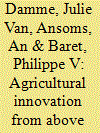

|
|
|
|
|
| Publication |
2014.
|
| Summary/Abstract |
In its 2008 World Development Report, the World Bank pleaded for a 'Green Revolution' for sub-Saharan Africa, pointing particularly to the importance of including smallholder farmers. This article focuses on the banana cropping system in Rwanda, and on the agricultural innovations introduced within this system. We first consider macro-level innovations that are designed to promote a modernized agricultural sector and that correspond to the rationale of the Green Revolution. We analyse how such 'top-down' innovations are received on the ground and show how smallholders seek to evade new government policies when they fail to reflect local economic and social realities. This demonstrates how some rural Rwandans are challenging the authority of the government in disguised ways in order to protect their local livelihoods. The Rwandan experience should inspire continent-wide Green Revolution policies to take account of the risk-coping rationale of small-scale farmers and their capacity to innovate 'from below'.
|
|
|
|
|
|
|
|
|
|
|
|
|
|
|
|
| 3 |
ID:
152350
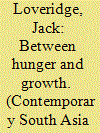

|
|
|
|
|
| Summary/Abstract |
Built from the ground up by three thousand Sikh and Hindu refugees in the aftermath of the Partition of India in 1947, the town of Nilokheri in East Punjab emerged as an unlikely centre of agricultural education and scientific exchange. With support from the Ford Foundation, Indian and American scientists and development planners worked through the 1950s to transform the refugee township into a model of agricultural innovation and community development. Prime Minister Jawaharlal Nehru even cast Nilokheri as the first step on the ‘road to new India’ that would bring the nation to self-sufficiency in food production. Over the course of a decade, experimental farms, workshops, and agricultural training centres rose around the village. The bustling town rapidly became an internationally recognised centre for deploying new farming technologies, training farmers, and sharing scientific knowledge. Yet for all its initial promise, allegations of bureaucratic mismanagement dogged the project, floodwaters disrupted the site in 1957, and Ford’s interest shifted by the early 1960s. The Nilokheri experiment, however, set the stage for the scientific and social interventions of India’s Green Revolution, contributing to an international development paradigm that persists today.
|
|
|
|
|
|
|
|
|
|
|
|
|
|
|
|
| 4 |
ID:
081224
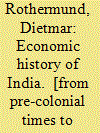

|
|
|
|
|
| Publication |
New Delhi, Manohar, 1989.
|
| Description |
214p.hbk
|
| Standard Number |
8185054525
|
|
|
|
|
|
|
|
|
|
|
|
Copies: C:1/I:0,R:0,Q:0
Circulation
| Accession# | Call# | Current Location | Status | Policy | Location |
| 044077 | 954/ROT 044077 | Main | On Shelf | General | |
|
|
|
|
| 5 |
ID:
168238
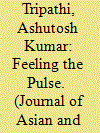

|
|
|
|
|
| Summary/Abstract |
Rising price of pulses is a matter of great concern for nutrition in India, which is home to the largest number of malnourished people in the world. The paper outlines policy strategies that can help in increasing the production of pulses and thereby making it available at affordable prices. The paper looks into neglect of pulses in agriculture policies that hampers farmers’ incentives to promote investment, technology and productivity. The analysis suggests for better incentives to farmers growing pulses in the form of higher minimum support prices, reflecting the true economic benefit of growing pulses coupled with a strong procurement network across the country. An action on technological front with focus on increasing yield levels thereby, reducing cost of production can be a game changer in pulse production.
|
|
|
|
|
|
|
|
|
|
|
|
|
|
|
|
| 6 |
ID:
125114


|
|
|
|
|
| Publication |
2013.
|
| Summary/Abstract |
FOOD SECURITY ISSUES have been the focus of the Group of Twenty since about 2005. Then it became clear that the era of continually rising food prices and growing farm output - an era lasting almost 50 years - was over. Despite the impressive results of the Green Revolution (from 1961 to 2000, global food production increased from 800 million to 2.2 billion tons), the average yield of major grain crops has been steadily declining - for wheat and rice from 2.5-3 % to 1%. Moreover, these phenomena were accompanied by steep jumps in food prices in 2007-2008 and 2010-2012. According to an estimate by the Food and Agriculture Organization (FAO), in 2010-2012, nearly 870 million people were chronically undernourished and the number of hungry people in the world remained unacceptably high.
|
|
|
|
|
|
|
|
|
|
|
|
|
|
|
|
| 7 |
ID:
120010
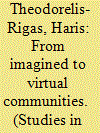

|
|
|
|
|
| Publication |
2013.
|
| Summary/Abstract |
The pivotal role played by Computer-Mediated Communications (CMCs) as mobilization tools for social movements as diverse as the 'Arab Spring', the Iranian 'Green Revolution', and the 2008 Greek 'December Riots', has rekindled academic interest in the internet as a field of sociological research. Drawing on new media and nationalism studies, this article approaches a particular type of CMC as a 'virtual community'. By examining the context of post-1999 Greek-Turkish reconciliation, it is argued that these virtual communities have offered significant breathing space for individuals who are ready to revisit, discuss, and negotiate the constitutive boundaries of modernity's 'imagined communities', and are therefore conducive to the Greek-Turkish rapprochement.
|
|
|
|
|
|
|
|
|
|
|
|
|
|
|
|
| 8 |
ID:
108883


|
|
|
|
|
| Publication |
India, Bharati Bhawan (Distributors), 1972.
|
| Description |
v, 180p.Hbk
|
|
|
|
|
|
|
|
|
|
|
|
Copies: C:1/I:0,R:0,Q:0
Circulation
| Accession# | Call# | Current Location | Status | Policy | Location |
| 010477 | 630.954/VER 010477 | Main | On Shelf | General | |
|
|
|
|
| 9 |
ID:
043303
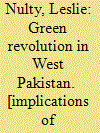

|
|
|
|
|
| Publication |
New York, Praeger Publishers, 1972.
|
| Description |
xxi, 150p.Hbk
|
| Series |
Praeger special studies in international economics and development
|
|
|
|
|
|
|
|
|
|
|
|
Copies: C:1/I:0,R:0,Q:0
Circulation
| Accession# | Call# | Current Location | Status | Policy | Location |
| 010751 | 630.95491/NUL 010751 | Main | On Shelf | General | |
|
|
|
|
| 10 |
ID:
121766
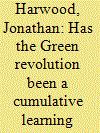

|
|
|
|
|
| Publication |
2013.
|
| Summary/Abstract |
Most members of the development community take for granted that policy should be evidence-based. Accordingly declarations of the need to 'learn the lessons of history' are a commonplace in the literature. At the same time there are also indications that this task is not usually taken very seriously in policy formulation. Summarising the history of peasant-friendly plant breeding from Central Europe around 1900 to the global South today, this paper argues that attempts to assist smallholder agriculture since 1945 have repeatedly failed to take into account the success or failure of earlier approaches. The evidence suggests that this neglect has been the result less of ignorance of past experience than of indifference toward it. The paper concludes by briefly considering possible reasons for this.
|
|
|
|
|
|
|
|
|
|
|
|
|
|
|
|
| 11 |
ID:
128555


|
|
|
| 12 |
ID:
115422


|
|
|
|
|
| Publication |
New Delhi, Academic Foundation, 2012.
|
| Description |
208p.
|
| Standard Number |
9788171889709
|
|
|
|
|
|
|
|
|
|
|
|
Copies: C:1/I:0,R:0,Q:0
Circulation
| Accession# | Call# | Current Location | Status | Policy | Location |
| 056839 | 333.91/POW 056839 | Main | On Shelf | General | |
|
|
|
|
| 13 |
ID:
042873


|
|
|
|
|
| Publication |
London, Macmillian, 1974.
|
| Description |
xv, 264p.
|
|
|
|
|
|
|
|
|
|
|
|
Copies: C:1/I:0,R:0,Q:0
Circulation
| Accession# | Call# | Current Location | Status | Policy | Location |
| 014553 | 338.16/GRI 014553 | Main | On Shelf | General | |
|
|
|
|
| 14 |
ID:
140669


|
|
|
|
|
| Publication |
London, Zed Books Ltd., 1986.
|
| Description |
xx, 298p.pbk
|
| Standard Number |
0862324343
|
|
|
|
|
|
|
|
|
|
|
|
Copies: C:1/I:0,R:0,Q:0
Circulation
| Accession# | Call# | Current Location | Status | Policy | Location |
| 027379 | 961.2042/BEA 027379 | Main | On Shelf | General | |
|
|
|
|
| 15 |
ID:
180271
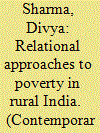

|
|
|
|
|
| Summary/Abstract |
Poverty is now widely recognised as multidimensional, with indicators including healthcare, housing and sanitation. Yet, relational approaches that foreground political-cultural processes remain marginalised in policy discourses. Focusing on India, we review a wide range of relational approaches to rural poverty. Beginning with early approaches that focus on structural reproduction of class, caste and to a lesser extent gender inequality, we examine new relational approaches developed in the last two decades. The new approaches examine diverse ways in which poverty is experienced and shapes mobilisations against deprivation. They draw attention to poor people’s own articulations of deprivation and alternate conceptions of well-being. They also show how intersecting inequalities of class, caste and gender shape governance practices and political movements. Despite these important contributions, the new relational approaches pay limited attention to technologies and ecologies in shaping the experience of poverty. Reviewing studies on the Green Revolution and wider agrarian transformations in India, we then sketch the outlines of a hybrid relational approach to poverty that combines socio-technical and -ecological dynamics. We argue that such an approach is crucial to challenge narrow economising discourses on poverty and to bridge the policy silos of poverty alleviation and (environmentally) sustainable development.
|
|
|
|
|
|
|
|
|
|
|
|
|
|
|
|
| 16 |
ID:
121107
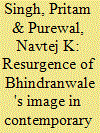

|
|
|
|
|
| Publication |
2013.
|
| Summary/Abstract |
This article will examine the resurgence since 2008 of the public imagery in Punjab of Sant Jarnail Singh Bhindranwale who symbolises a Sikh separatist movement against the Indian state which took shape in the 1980s. The rebellion, characterised in the mainstream urban-based Indian media as an extremist Khalistan movement, had its strongest years of support in the rural areas of Punjab from 1984 until the early 1990s. However, over 25 years later, the symbol of Bhindranwale, who was killed in the Indian army's Operation Blue Star, has re-emerged. The 'bazaar economy' has provided a new canvas for the imagery of Bhindranwale, whose images are today visible in commodified forms available for purchase in shops and market stalls in Punjab. This article analyses this resurgence as a public response to contemporary politics in Punjab and locates the circulation of Bhindranwale through souvenir-like goods within the region's 'economic base of place' (Urry. 1995. Consuming Places. London: Routledge) in which the consumer market has enabled a conduit through which identity and political culture can be both purchased and displayed. The article examines the backdrop of his emblematic re-emergence within the historical context as it relates to the collective memory of 1984 and the meanings of Bhindranwale's legacy and symbolism for the current times.
|
|
|
|
|
|
|
|
|
|
|
|
|
|
|
|
| 17 |
ID:
132453


|
|
|
|
|
| Publication |
2014.
|
| Summary/Abstract |
Tahir-ul-Qadri's slogan of a green revolution may ring hollow with most Pakistani, who view the cleric as nothing more than a pawn on the political chessboard.
|
|
|
|
|
|
|
|
|
|
|
|
|
|
|
|
| 18 |
ID:
184118
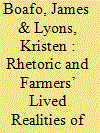

|
|
|
|
|
| Summary/Abstract |
This paper presents a political ecological analysis of the drivers and impacts of Green Revolution technologies – including improved seeds, chemical fertiliser and other agrochemicals – in the Brong Ahafo Region of Ghana. We identify national government, foreign investment and philanthro-capital as key drivers in shaping both narratives and uptake of Green Revolution technologies at the local level. Drawing from interviews and focus groups, our findings demonstrate that Green Revolution technologies deliver a range of negative local-level socio-ecological impacts, including increasing the overall costs of production, as well as exacerbating poverty and inequality amongst farmers. Our findings demonstrate the disconnection between claims that Green Revolution technologies increase food security and income, and lived experiences of farmers.
|
|
|
|
|
|
|
|
|
|
|
|
|
|
|
|
| 19 |
ID:
133287
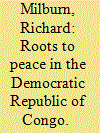

|
|
|
|
|
| Publication |
2014.
|
| Summary/Abstract |
The Democratic Republic of Congo (DRC) is endowed with an abundance of natural resources, and the presence of high-value resources such as coltan and diamonds is well known. The country is also endowed with a wealth of biodiversity, although the value of this is often overlooked. This article describes the detrimental impact of armed conflict on this biodiversity and the dangers posed by the return of peace, which is likely to result in increased biodiversity exploitation. The resulting loss of key carbon sinks crucial to the global fight against climate change will affect not only the DRC, but also the international community. Biodiversity is therefore identified as a threat to security but also a valuable asset for development, and this article discusses methods to realize the value of biodiversity in the DRC through the benefits of ecosystem services and income generated from monetizing biodiversity. It concludes by arguing that the false dichotomy of conservation and development as separate entities and objectives needs to change so that conservation becomes a central pillar of security and development work in the DRC and other regions of current or recent armed conflict around the world.
|
|
|
|
|
|
|
|
|
|
|
|
|
|
|
|
| 20 |
ID:
031236
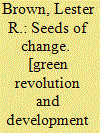

|
|
|
|
|
| Publication |
New York, Praeger Publishers, 1970.
|
| Description |
xv,205pHbk
|
|
|
|
|
|
|
|
|
|
|
|
Copies: C:1/I:0,R:0,Q:0
Circulation
| Accession# | Call# | Current Location | Status | Policy | Location |
| 008344 | 630/BRO 008344 | Main | On Shelf | General | |
|
|
|
|
|
|
|
|
|